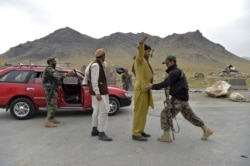Troops and equipment are leaving Afghanistan, days ahead of the official start of the U.S. withdrawal, the White House said Thursday, marking the beginning of the end of America’s longest war.
“A drawdown is under way,” White House deputy press secretary Karine Jean-Pierre told reporters aboard Air Force One, as President Joe Biden headed to Georgia Thursday for a rally.
“It will be deliberate and conducted in a safe and responsible manner that ensures the protection of our forces,” she said. “Potential adversaries, should they attack us, our withdrawal, we will defend ourselves, our partners, with all the tools at our disposal.”
Also Thursday, a NATO official confirmed to VOA that some of the 7,000 troops sent to Afghanistan as part of the multinational Operation Resolute Support had also left the country.
“We plan to have our withdrawal completed within a few months,” the official said.
Confirmation of the pullout came just a day after Biden defended the decision in a speech to a joint session of Congress.
Biden said the war in Afghanistan, launched after the September 11, 2001, terror attacks on the World Trade Center in New York and the Pentagon near Washington, “were never meant to be multigenerational undertakings.”
“We went to Afghanistan to get terrorists, the terrorists who attacked us,” Biden said, adding that justice was served. "After 20 years of valiant valor and sacrifice, it’s time to bring those troops home."
But the White House also confirmed Thursday that the number of U.S. forces in Afghanistan would soon be going up, as additional safety measures are put in place.
"Elements of an Army Ranger task force will temporarily deploy to Afghanistan to assist with force protection,” Jean-Pierre said.
The U.S. has also sent four B-52 long-range bombers to Qatar to provide air cover for the withdrawal, while the USS Dwight D. Eisenhower carrier strike group is also staying in the region until July to provide additional capabilities.
The commander of U.S. Forces in Afghanistan, General Scott Miller, told reporters in Kabul that elements of the withdrawal had begun and that U.S. troops were in the process of turning facilities and equipment over to the Afghan security forces.
But the departure of the first of the 2,500 to 3,500 U.S. troops still in Afghanistan came as Afghan officials said their forces were engaged in heavy fighting against insurgent Taliban fighters across the country.
Ministry of Defense spokesman Fawad Aman, in an interview with VOA’s Afghan Service, described it as a widespread campaign by the Taliban to challenge Afghan security forces on multiple fronts.
Top U.S. military officials, while defending the drawdown, have voiced concern about the escalating violence and the ability of Afghan forces to withstand the mounting pressure.
“It will be a difficult time for the Afghan military," General Kenneth “Frank” McKenzie told Alhurra Television on Thursday.
"We will still continue to support from what we call ‘over the horizon,’ and we're working out the details of that right now," he said. "But now is the time when they're going to actually have to do it."
Steve Herman and the VOA Afghan Service contributed to this report.





